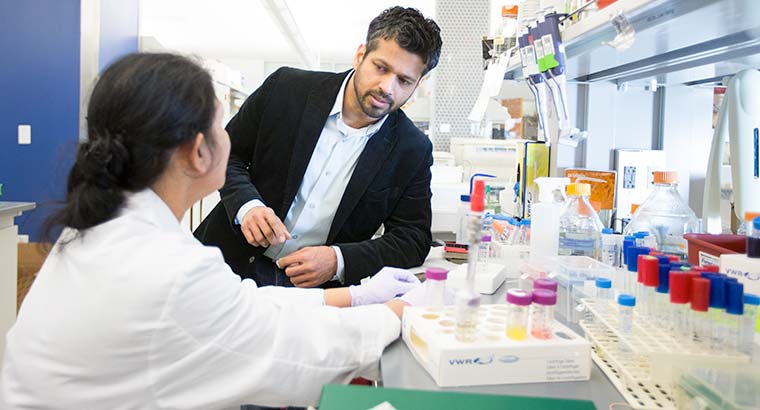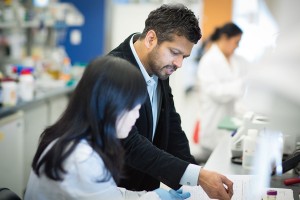Collaboration: $16.6M TB Grant
 isbscience.org/news/2013/08/15/collaboration-16-6m-tb-grant/
isbscience.org/news/2013/08/15/collaboration-16-6m-tb-grant/

Dr. Nitin Baliga, SVP and Director for ISB, will serve as Co-PI for the Modeling Core for the $16.6 million NIH grant to study tuberculosis progression.
ISB will collaborate with Seattle BioMed and ETH Zurich on a $16.6 million tuberculosis grant from the National Institutes of Health. Seattle BioMed issued this press release today:
FOR IMMEDIATE RELEASE
SEATTLE, AUG. 15 — Seattle BioMed has been awarded a grant from the National Institute of Allergy and Infectious Diseases, part of the National Institutes of Health, that will take a comprehensive systems approach to the problem of tuberculosis (TB) infection, harnessing the power of technology and systems biology to examine the progression from latent infection to disease.
The grant will total up to $16.6 million over a five-year period. One third of the world’s population latently carries the bacterium that causes TB, and 8.7 million new cases of TB are diagnosed each year. The research will be focused on predicting which carriers will become actively ill with TB.
“Research in TB has never been more critical, and this collaboration represents an important change in how disease research is done, making a move from a ‘trial and error’ approach to predictive modeling,” says Alan Aderem, Ph.D., president of Seattle BioMed. “By drawing on our collective expertise, and by taking advantage of the predictive power of systems biology, we can tackle the problem of TB in an entirely new way, potentially elucidating new drug targets or informing vaccine development.”
The grant integrates the expertise of several scientists at Seattle BioMed, in collaboration with the Institute for Systems Biology (ISB) and ETH Zurich.
Alan Aderem will serve as Co-Principal Investigator (PI) of the program and Co-PI of the Omics Core.
David Sherman, Ph.D., is the Co-PI of the program and Co-PI of the Pathogen Project.
Kevin Urdhal, Ph.D., is the Co-PI of the Host Project.
Dan Zak, Ph.D., is the Co-PI of the Data Core.
Nitin Baliga, Ph.D., of ISB will serve as the Co-PI of the Modeling Core.
Ruedi Aebersold, Ph.D., of ETH Zurich will serve as Co-PI of the Technology Core.
The team of researchers comprises experts from both the host side of the disease and the pathogen side, along with authorities in the field of systems biology and biotechnology.
TB’s transition from a latent infection to active disease is a complex process involving nuanced interactions between the bacterium that causes disease and the human immune system. The grant, titled “Omics of TB Disease Progression,” will for the first time allow researchers to study many sides of TB infection simultaneously, uncovering the mysteries of how and in whom TB causes illness.
“With this project, we hope to identify genes in both humans and bugs that work together to cause disease,” says Sherman. “It will give us the first comprehensive picture of how TB, a notoriously elusive pathogen, progresses to disease.”
Globally, someone develops active TB disease every four seconds, and someone dies from TB every 20 seconds. Drug resistance is an enormous challenge in treatment, with 3.7 percent of new cases and 20 percent of previously treated cases resistant to at least one course of drug treatment. Totally drug resistant TB has also emerged in several countries. Additionally, HIV facilitates the latent-to-active transmissions of TB because it weakens the immune system. Although TB is the second-leading infectious disease killer worldwide, and the biggest disease killer of HIV-positive people, it receives far less research funding than either HIV/AIDS or malaria.
ABOUT SEATTLE BIOMEDICAL RESEARCH INSTITUTE:
Seattle BioMed is the largest independent, non-profit organization in the U.S. focused solely on infectious disease research. Our research is the foundation for new drugs, vaccines and diagnostics that benefit those who need our help most: the 14 million who will otherwise die each year from infectious diseases, including malaria, HIV/AIDS and tuberculosis. Founded in 1976, Seattle BioMed has more than 330 staff members. By partnering with key collaborators around the globe, we strive to make discoveries that will save lives sooner. For more information, visit www.seattlebiomed.org.
Research reported in this press release was supported by the National Institute of Allergy and Infectious Diseases, part of the National Institutes of Health, under award number U19AI106761-01. The content is solely the responsibility of the authors and does not necessarily represent the official views of the National Institutes of Health.





